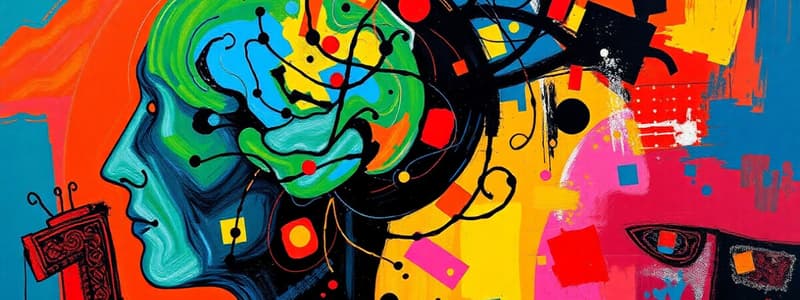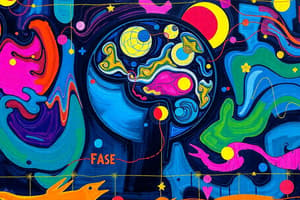Podcast
Questions and Answers
What characterizes REM sleep?
What characterizes REM sleep?
- Repetitive cycles of waking and sleeping
- Rapid eye movements and muscle paralysis (correct)
- Decreased heart rate and blood pressure
- Slow wave brain activity
Which sleep stage is responsible for memory consolidation?
Which sleep stage is responsible for memory consolidation?
- REM sleep
- Stage N2
- Stage N3 (correct)
- Stage N1
Which theory posits that dreaming fulfills unconscious urges?
Which theory posits that dreaming fulfills unconscious urges?
- Wish fulfilment theory (correct)
- Dream incubation theory
- Circadian rhythm theory
- Activation-synthesis theory
What is a common consequence of jet lag?
What is a common consequence of jet lag?
Where in the body is the human biological clock located?
Where in the body is the human biological clock located?
What does dualism propose about the mind and brain?
What does dualism propose about the mind and brain?
Which level of consciousness involves mental activity that is not currently conscious but can be easily accessed?
Which level of consciousness involves mental activity that is not currently conscious but can be easily accessed?
What condition is associated with a lack of ability to consciously recognize faces?
What condition is associated with a lack of ability to consciously recognize faces?
What is described as a condition where significant changes in mental processes are noticeable?
What is described as a condition where significant changes in mental processes are noticeable?
What describes the phenomenon of processing visual information without conscious awareness?
What describes the phenomenon of processing visual information without conscious awareness?
Which approach to consciousness describes it as a single phenomenon?
Which approach to consciousness describes it as a single phenomenon?
What kind of stimuli are presented so briefly that they become undetectable to the individual?
What kind of stimuli are presented so briefly that they become undetectable to the individual?
What level of consciousness involves mental activities that people are generally aware of?
What level of consciousness involves mental activities that people are generally aware of?
What aspect of consciousness did William James describe as a 'stream'?
What aspect of consciousness did William James describe as a 'stream'?
Which of the following best describes the non-conscious level of mental activity?
Which of the following best describes the non-conscious level of mental activity?
Flashcards are hidden until you start studying
Study Notes
Consciousness
- Awareness of external stimuli and our own mental activity.
- Dualism: Mind and brain are distinct but interact.
- Materialism: Mind and brain are the same.
- Theatre View: Consciousness is a singular phenomenon, a stage for mental events.
- Parallel Distributed Processing: Consciousness arises from interactions between multiple parallel streams of information processed in different brain regions.
Levels of Consciousness
- Conscious: Mental activities we are normally aware of.
- Non-conscious: Mental activity inaccessible to conscious awareness.
- Preconscious: Mental activity not currently conscious but easily accessible (e.g., humming without realizing).
- Unconscious: Influences consciousness despite being unaware.
Neuropsychology of Consciousness
- Prosopagnosia: Inability to recognize faces consciously.
- Anterograde Amnesia: Inability to form new memories.
Processing Without Awareness
- Evidence for mental processing without awareness comes from:
- Anaesthesia
- Blindsight
- Hunches & intuition
- Priming
States of Consciousness
- Active: Waking state.
- Positive: Daydreaming.
- Altered: Changes in mental processes noticeable to individual or others.
- Sleep
- Drug use
- Hypnosis
Sleep
- Non-REM (NREM) Sleep: Stages N1, N2, and N3; characterized by slower and deeper breathing, calm heartbeat, reduced blood pressure, and slower brain waves.
- Stage N3 is slow-wave sleep. Consolidates memories.
- Rapid Eye Movement (REM) Sleep: Resembles waking state in brain activity but involves rapid eye movements and muscle paralysis.
- EEG similar to an awake individual.
- Restores norepinephrine sensitivity.
Circadian Rhythm
- A biological cycle that repeats approximately every 24 hours (e.g., waking and sleeping).
- Located in the suprachiasmatic nuclei of the hypothalamus (body clock).
REM Behavior Disorder
- Loss of muscle tone during REM sleep does not occur, allowing individuals to act out their dreams.
Dreaming
- Wish-Fulfillment (Sigmund Freud): Dreams satisfy unconscious desires and resolve unconscious conflicts.
- Activation-Synthesis Theory: Signals from the hindbrain activate the cerebral cortex, resulting in dream content.
Studying That Suits You
Use AI to generate personalized quizzes and flashcards to suit your learning preferences.



